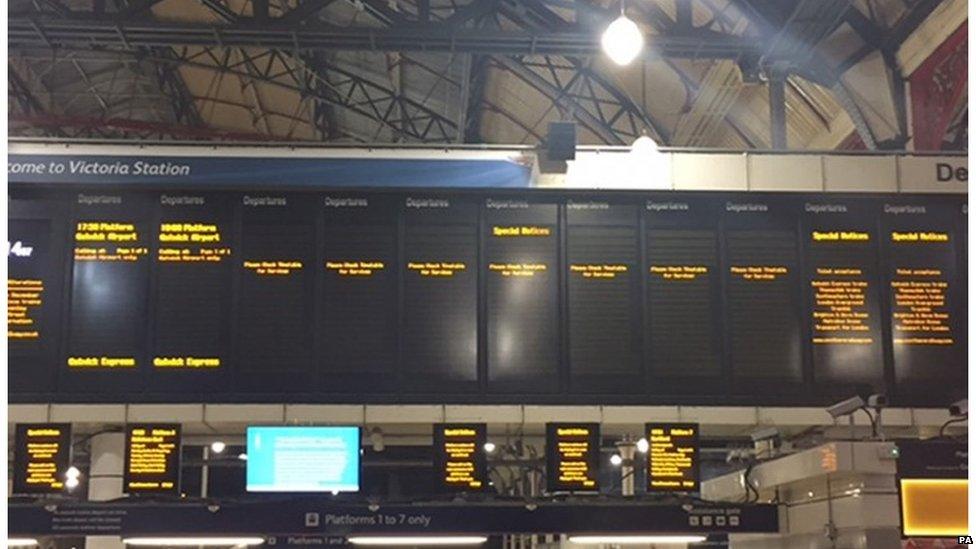The politics behind the Southern rail dispute
- Published

Will passengers put up with much more disruption?
From the outside in, this is a classic industrial face-off. A company wants to change how its staff work. The unions cry foul and refuse to agree.
No dispute is really ever that simple, but in the case of Southern and the rail unions, it's not even the half of it.
Why all this fuss over doors on the packed commuter lines between London and the South Coast, when agreements on the same issue have been reached in other parts of the country?
The RMT is adamant this is about safety. A union spokesman says the ball is in Southern's court, and rather than "winding up the rhetoric" and threatening to ban rail strikes, a process that would take months of producing new controversial legislation, the Union says that the transport secretary needs to "get out of his bunker and drag his contractors" to the table.
But hang on, driver-only trains have been used on different services around the country for three decades. This is about power too.
One former senior minister tells me that "successive secretaries of state" in charge at Transport have wanted to "get rid of guards on trains". The ambition is to bring down the cost of rail travel for the tax payer and the train passenger.
Talks at finding a way forward will start on Wednesday
With that considered to be a long term ambition, it's no surprise that the RMT, the only union that represents guards, wants to fight this every step of the way. Union sources deny it, but it's suggested that they have dug in in this dispute, because if they lose it, they also lose a big chunk of their industrial muscle.
If there have to be guards on trains, a strike works if they walk out. If services can run with drivers on their own, their power to disrupt would be reduced. It's worth noting that the RMT has more than 80,000 members, nearly ten times as many as the drivers' union, ASLEF. It's ASLEF that has agreed to meet Southern for talks tomorrow.
So this seems about union leverage, and it's suggested there's rivalry between the two.
But this mess is also about the strange system that's developed since the railways were privatised. Huge amounts of taxpayers' cash is being poured into the railways right now - more than £7bn.
And with enormous amounts of it being spent updating the services in question at the moment, there was always going to be huge disruption.
Because that disruption would be in the gift of Network Rail which runs the works, not the company which runs the trains, no commercial firm would likely have been willing to take on the contract.
Chris Grayling has big plans for the railway network
Simply, they weren't sure that they would have been able to turn a profit. As a result, Southern took on the contract to operate the services but the government keeps the revenue and pays out for any problems.
In the words of one source, Network Rail have made a "complete hash" of the engineering works on the relevant lines, and this has added to the levels of hostility towards Southern, even though it is distinct from the issue over doors.
But how could the government untangle this mess, given that they are not an objective bystander, but as Southern's 'client' an interested party?
A senior source told me that after months of ill-will building, there is only a tiny chance that the two warring sides will make peace.
They suggest something more radical, the government taking the contract in house, saying "serious conversations need to be had about whether it is time to take back control of the contract and for the government to sort out this dispute. This is, or will, be happening across the country. We cannot have the transformation of our railways being held hostage."
Right now, the Department for Transport questions whether that is even possible.
We're told terminating the contract is not at all on Chris Grayling's agenda. But if the unions and the company continue to fail to agree, there aren't many other options.
No government wants hundreds of thousands of frustrated commuters, getting angrier every day. Unless ACAS can work miracles on Tuesday, this fraught and complicated dispute looks like going on and on.
But in the words of one former minister, "a lot of this is railway politics - while the public is being made to suffer". Sooner or later the government might feel they have no option but to reach for a bolder solution.